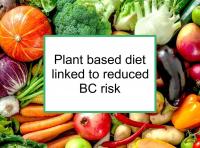A number of studies have reported that diets high in vegetables are associated with a lower risk of breast cancer, especially hormone receptor negative (ER-/PR-) disease. Now a major new study has reported on the impact of five different dietary patterns on breast cancer risk among women in the California Teachers Study cohort.
Studies previously have found reductions in breast cancer risk for leafy green vegetables (e.g., spinach, parsley), fruiting vegetables (tomatoes, bell peppers), cruciferous vegetables (broccoli, cabbage), root vegetables (carrots, turnips), allium vegetables (onions, garlic, leeks), and diets emphasizing these foods.
Latest research finds plant-based diet reduces breast cancer risk
The study referenced at the beginning of this news story was designed to evaluate common dietary patterns in California women in relation to the risk of breast cancer. To conduct the study, the authors analyzed data from 91,779 female participants in the California Teachers Study cohort. A total of 4,140 of the women were diagnosed with invasive breast cancer during follow up between 1995 and 2009.
The authors performed a sophisticated analysis to identify five predominant dietary patterns in this population of women:
- Plant-based—high in fruit and vegetables
- High-protein/high-fat—high in meat, eggs, fried food, and high-fat condiments
- High-carbohydrate—high in convenience foods, pasta, and bread
- What the authors describe as an ethnic diet (Asian American)—high in legumes, soy foods, rice, and dark leafy vegetables
- Salad and wine—high in lettuce, fish, wine, low-fat salad dressing, and coffee and tea.
Perhaps surprising to some women who might consider this a relatively healthy diet, the salad and wine dietary pattern was found to be associated with increased risk of breast cancer, particularly for ER+/PR+ disease. This affect was only slightly reduced after adjusting for alcohol consumption (wine, including both white and red wine, is a breast cancer risk factor).
The authors conclude that a plant-based dietary pattern is associated with a reduced breast cancer risk, especially hormone receptor positive tumors, offering a potential avenue for prevention.
